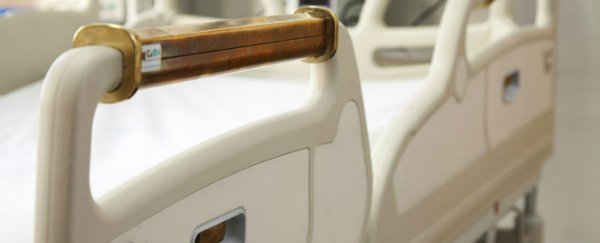You know what's not cool? Checking yourself into hospital for one illness, only to contract another illness purely by virtue of the fact that you're currently in a hospital. That's bad news for everyone, because you have to stay in hospital for longer, which means more cost for hospital to keep you there and treat you.
But new research has come up with a way to curb all the gross infections spread in hospital wards - copper bed rails. Because, apparently, copper kills everything.
According to the US Office of Disease Prevention and Health Promotion, one in 25 hospital patients are affected by hospital-related infections, such as pneumonia, urinary tract infections, and methicillin-resistant Staphylococcus aureus (MRSA), and it costs $40 billion a year to treat them. In Australia, there are reportedly around 200,000 cases in hospitals every year. Sometimes people die from these infections. For developing countries, that rate is even higher.
Eighty percent of these infections are spread because of surface contact in hospitals, and the biggest offender is the bed safety railing, touched by all manner of staff and patients throughout the day. Calling them "the most contaminated surface" in the room, researcher Constanza Correa from a Chile-based start-up called Copper BioHealth has installed 150 copper bed rails in four hospitals around the country to see if they can curb the rate of infection.
It sounds odd, but copper is actually a known microbe killer. In fact, according to Hannah Bloch at NPR, people have known about its antimicrobial properties since at least 2,600-2,000 BC, when an ancient Egyptian medical text was written about how it could be used to sterilise wounds and treat water. "Bacteria, yeasts and viruses are rapidly killed on metallic copper surfaces, and the term 'contact killing' has been coined for this process," Correa and her team report in the journal Applied and Environmental Microbiology.
Talking to Goats and Soda, Correa says these copper railings cost between $60 to $100 per bed per month, which seems pretty steep, but she says by reducing the cost of infection treatment, they'll have paid for themselves within three years.
While the results of Correa's copper bedrail experiment are yet to be published, Bloch points to another study that was published by US researchers last year. Reporting in the journal Infection Control and Hospital Epidemiology, the team led by Cassandra D. Salgado from the Medical University of South Carolina in the US reported that the presence of copper bed rails "reduced the number of healthcare-acquired infections from 8.1 percent in regular rooms to 3.4 percent in the copper rooms".
It's not entirely clear why copper, as Correa puts it, "kills everything". It's been suggested that the process occurs in two stages - firstly as soon as a single-cell bacterium comes into contact with a copper surface, the interaction causes its outer membrane to rupture and become full of holes.
According to the International Copper Association (ICA), this occurs because this outer membrane is maintained by a "stable electrical micro current", also known as a transmembrane potential, which causes a voltage difference between the inside and outside of the bacterium. "It is strongly suspected that when a bacterium comes in contact with a copper surface, a short circuiting of the current in the cell membrane can occur," says the ICA. "This weakens the membrane and creates holes."
The other option is that copper molecules can actual cause 'rust' to occur in the cell membrane.
Now that the bacterium's outer membrane is full of holes, we arrive at the second deadly stage - copper ions start rushing into the single-cell bacterium, overwhelming it and grinding its metabolic activity to a halt. "The bacterium can no longer 'breathe', 'eat', 'digest' or 'create energy'," says the ICA, and so it dies.
Correa says if their experiment proves a success, she'll push for copper surfaces elsewhere in hospitals, such as on bedside tables, IV poles, and mattress covers.
Sources: NPR, International Copper Association
